News
States Banning Alcohol Won’t Get VAT On Beer

A former Health Minister, Prof Isaac Adewole, has advocated fiscal federalism where states get funds commensurate to what they bring into the federation account.
Adewole, a former Vice Chancellor of the University of Ibadan, was a guest on Inside Sources with Laolu Akande, a socio-political programme aired on Channels Television on Friday.
Adewole urged governors to allow the local government areas to function as an independent tier of government.
He backed the persistent call for restructuring and resource control by sub-nationals. “I am an apostle of fiscal and physical federalism,” he said.
He added that though it was late for a return to regionalism, states should be allowed to grow on their own and based on the resources within their domains.
Specifically, the former minister said states that prohibit the sale of alcoholic drinks should not get out of the Value Added Tax (VAT) on beer through the federation account.
He said, “We need to look at how we share the resources of this country. If you have a law that prevents you from selling alcohol, that law should also prevent you from sharing money from alcohol. We should be honest with ourselves. States that prohibit the sale of alcohol should not share out of VAT from alcohol. Straight forward.
“Then we should also ask each state what they are bringing to the table. A situation where states only share money from oil is absurd and that is why we are where we are today because the other states are not bringing anything to the table.
“What is happening to our gold, bitumen, lithium? The resources from all of these, where are they? The only thing we know is oil money.”
At the moment, many of the 19 northern states where Sharia law is practised forbid the sale of alcohol in their domains. In some of the states, sub-nationals established religious police known as Hisbah to enforce the ban on alcoholic drinks.
Back in 2021, talks about 7.5% VAT collection on goods including alcohol by state governments made the headlines for months with Rivers and Lagos states being at the forefront of the move.
A Federal High Court in Port Harcourt, the Rivers State capital, had ruled that states, and not the Federal Inland Revenue Service (FIRS), should collect VAT and Personal Income Tax.
Some northern state governments had preferred the Federal Government to continue VAT collection and the FIRS had challenged the ruling of the high court in the oil-rich South-South state.
An appellate court would later order Lagos and Rivers governments to maintain status quo on the matter and the move entered a stalemate.
The VAT collected by the FIRS contributes significantly to the total revenue generated by the Federal Government. The total sum collected monthly is distributed among the three tiers of government, with the Federal Government getting 15% of the VAT revenue, while states and local governments get 50% and 35%, respectively.
News
Just in: Finally, Trump imposes 14% tarriff on Nigeria oil, others

The United States President Donald Trump has announced sweeping global tariffs on all imports into the country, slamming 14 percent on Nigeria.
According to 2023 data published by Observatory of Economic Complexity (OEC), Nigeria exported $6.29 billion to US.
The main exports were crude Petroleum ($4.73 billion), Petroleum gas ($920 million), and nitrogenous fertilisers ($167 million).
Over the past five years, according to OEC, Nigeria’s exports to the US have increased at an annualised rate of 1.59 percent, from $5.81 billion in 2018 to $6.29 billion in 2023.
Stocks had closed higher before Trump’s announcement but later buckled under the weight of the new order, disrupting business decisions and raising fears of a global trade war.
Trump said he was optimistic the numbers would improve, maintaining that the decision was critical for America’s restoration as the world’s sole superpower.
After delivering his speech, Trump signed the decision as an executive order.
The executive order imposes a “baseline” 10 percent tariff on all imports as well as individualised reciprocal tariff rates on over 60 countries.
He told foreign leaders “who will soon be calling to ask for exemptions from these tariffs” to drop theirs first.
Parts of the order had different implementation timelines, with some beginning as early as in a few hours.
“Effective at midnight, we will impose a 25-percent tariff on all foreign-made automobiles,” Trump noted.
The “baseline” 10 percent tariff would start on April 5, while higher rates on various partners would begin on April 9.
According to the US government, Nigeria charges 27 percent tariffs to the US. The report included currency manipulation and trade barriers as contributors to the amount.
In retaliation, Trump imposed a 14 percent retaliatory tariff on Nigeria.
Countries like China and Mexico already grappling with previously imposed tariffs were hit with additional rates.
Here are the country-specific tariff rates:
China –34 percent
India — 26 percent
South Korea — 25 percent
Japan — 24 percent
Taiwan — 32 percent
United Kingdom — 10 percent
Vietnam — 46 percent
Switzerland — 31 percent
Cambodia — 49 percent
South Africa — 30 percent
Indonesia — 32 percent
Brazil — 10 percent
Singapore — 10 percent
News
Air Algerie Inaugural Flight to Abuja Will Strengthen Nigeria-Algeria Ties – FG
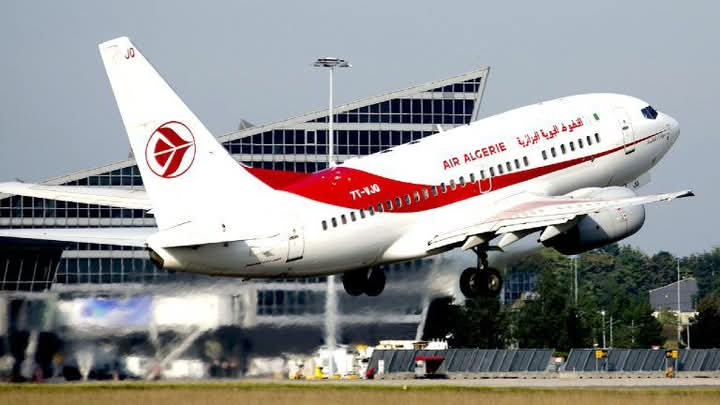
By Gloria Ikibah
As part of ways t to deepen diplomatic and economic ties between Nigeria and Algeria, Air Algerie will commence direct flights from Algiers to Abuja on April 6, 2025.
according to a statement by the Acting Spokesperson of the Ministry of Foreign Affairs, Kemiebi Ebienfa, this milestone follows the implementation of the Bilateral Air Services Agreement (BASA) between both nations.
The new route, operated by Algeria’s national carrier using a Boeing 737 aircraft, is expected to improve connectivity, promote tourism, and facilitate trade and investment between the two countries. The Ministry of Foreign Affairs described the development as a testament to the growing cooperation between Nigeria and Algeria.
“This landmark development equally underscores the shared commitment of both countries to deepening bilateral cooperation in aviation, commerce, and people-to-people exchanges.
The Ministry commends the significant role played by the Embassy of Nigeria in Algiers for not only facilitating this noble goal but also seeing to its fruition. The Charge d’Affaires of the Embassy of Nigeria in Algiers, leadership of the Nigerian Community in Algeria and representative of the Algerian Government are expected to be on board the scheduled inaugural flight,” the statement read.
The Federal Government has assured full support for the success and continuity of the service.
“We believe this initiative will further strengthen the longstanding friendship between Nigeria and Algeria while opening new opportunities for mutual growth,” the statement added.
Air Algerie’s entry into the Nigerian market also presents an opportunity for Nigerian travelers. The airline’s affordable fares and Algeria’s proximity to Europe could serve as an easier gateway for Nigerians heading to Europe.
The direct flights will operate twice a week, and the government is encouraging Nigerian citizens and businesses to take advantage of the opportunity for trade, tourism, and cultural exchange.
With anticipation building ahead of the inaugural flight, stakeholders in aviation and commerce see this as a step towards stronger economic ties between the two African nations.
News
Rivers APC demands Fubara’s probe over ex-HoS allegations

The Chairman of the All Progressives Congress in Rivers State, Chief Tony Okocha, has called for the probe of suspended Governor Siminalayi Fubara and his loyalists over the demolition of the state House of Assembly complex and alleged misappropriation of funds.
Okocha based his call on the statement by former Head of Service in the state, George Nwaeke, who alleged at the weekend that Fubara sponsored the bombing of the Assembly complex to avert his impeachment by lawmakers.
But Fubara’s Special Adviser on Electronic Media, Jerry Omotsegunwa, dismissed the probe call, saying, “It is laughable for any right-thinking individual to believe the video confessions of the erstwhile HoS.”
Omotsegunwa described the HoS allegation as childish, incoherent and ill-prepared.
The ex-HoS had at the weekend claimed to have witnessed Fubari handing over a bag of money to his Chief of Staff, Edison Ehie, to destroy the Assembly complex.
Both Fubara and Ehie vehemently denied the allegation, insisting that Nwaeke was under the influence and not in his right frame of mind when he made the allegations. Additionally, Ehie said he had instructed his lawyer to start a defamation suit against Nwaeke.
But on Wednesday, Okocha, an ally of Fubara’s estranged godfather, Nyesom Wike, said Nwaeke’s allegation could not be dismissed because he was the number three man in the state as the HoS.
Okocha argued that Nwaeke’s revelation had vindicated the APC’s earlier position on the matter, specifically implicating suspended Fubara and Ehie, as being responsible for the Assembly complex attack.
He said, “Nwaeke’s account further corroborates the position of Rivers APC that Fubara is the architect of the entire political crisis in the state, leading to the swift declaration of a state of emergency of President Bola Tinubu to restore order and forestall a total breakdown of peace.
“The truth is like broad daylight, which shines through the darkness and repels darkness to bring forth daylight. It is important to state here, for the purpose of emphasis and clarity, that Nwaeke, as the Head of Service at the time, was the number three man in the state. As such, his account cannot be hearsay.
“Taxpayers money in Rivers State was wasted in a way and manner that cannot be forgotten in a hurry amidst scarce resources and global economic crunch. The Supreme Court put it rightly in her unanimous judgment delivered on 28th February 2025 by describing Fubara as a dictator. Yes, he was a dictator!”
Okocha called on security agencies to investigate the claim and bring all those involved, whether directly or indirectly, to book.
The APC chairman also berated those criticising Nwaeke for airing his mind.
“The APC in Rivers State is strong in her belief that the relevant security agencies will be professional enough to get at the root cause of this whole matter and make such public.
“The verbal attacks staged against the resigned HoS, will not deter the statesman from unveiling the rots of Sim Fubara’s which we harped on as opposition political party. On this matter, APC shall function as watchdogs,” he stated.
Reacting, however, Fubara’s aide, Omotsegunwa, said the HoS allegation was unreliable and fraught with inconstistencies.
He said, “That was like something that was cooked up and ill-prepared. I don’t think anybody should take that confession seriously. Three confessions, three videos contradicting each other. Which security agent or agency will take that type of thing seriously?
“First, he (Nwaeke) said he was in a meeting between the Governor and the now Chief of Staff (Edison Ehie) and the former Chairman of Ohio/Akpor local government area, Chijioke Ihunwo.
“That he saw when they were discussing how to bomb the House of Assembly. And the next video he made was that he was not there; he was told. Meanwhile, he saw them carrying bags, not knowing what they contained. Later he said they carried bags of money. Is that what we should be thinking of?
“So, what money is Tony Okocha saying they should probe the governor for? The phantom N16bn that does not exist anywhere?”
Omotsegunwa said the state’s Sole Administrator had looked at Fubara’s projects and commended him as a prudent person.
“So, I don’t know what else Tony Okocha is talking about. How can anyone believe the crass, illogical videos? It doesn’t make any sense to me, “ he added.
-

 Business20 hours ago
Business20 hours agoBank stops transfer fees on online transactions
-

 News7 hours ago
News7 hours agoRivers APC demands Fubara’s probe over ex-HoS allegations
-
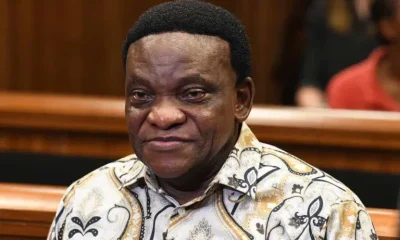
 News19 hours ago
News19 hours agoS/African Court Acquits Nigerian Pastor Of Rape, 31 Other Charges
-
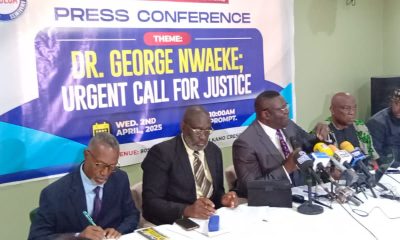
 News22 hours ago
News22 hours agoEx-HoS Allegations Against Fubara: 30 CSOs ask security and anti-graft agencies to summon suspended governor, CoS
-

 News22 hours ago
News22 hours agoTinubu to embark on working visit to Paris
-

 Economy7 hours ago
Economy7 hours agoNaira rebounces against the dollar in parallel market
-
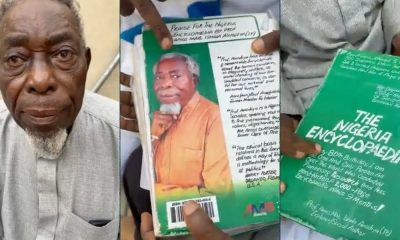
 News8 hours ago
News8 hours agoVideo: Professor Returns To Nigeria With Nothing After 48 Years In Canada
-
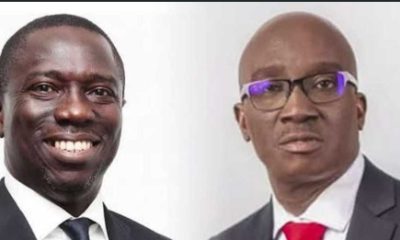
 News14 hours ago
News14 hours agoEdo guber: APC’s Okpebholo wins at Tribunal





